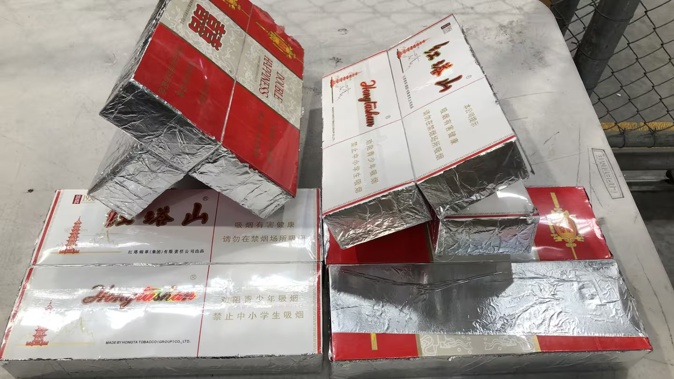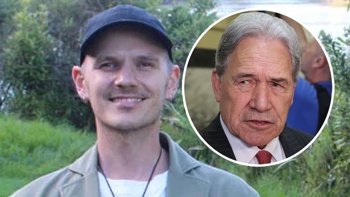

A businessman once dubbed the “little prince of counterfeit cigarettes” who imported millions of drugs into New Zealand will be deported despite a last-ditch appeal to remain in the country.
Han Zhang’s smuggling operation started off with him importing black-market tobacco to prop up his failing business in 2018 but quickly spiralled into importing Class-A drugs and ingredients.
By the time Customs officials caught up with him he’d brought more than 21 kilograms of meth into the country, 7kg of MDMA and nearly as much pseudoephedrine.
Authorities estimated the drugs Zhang smuggled over several years would have been worth upwards of $5.5 million.
His black-market cigarette business was estimated to have been worth roughly $470,000 in the two or so years he’d been skirting paying duty tax on them.
Zhang was sentenced to 11 years in prison at the start of 2022 on 36 charges and several months later was served with a deportation notice by Immigration New Zealand.
Now, from behind bars Zhang has appealed to the Immigration and Protection Tribunal to stay in the country so he can be near his child.
In a recently released ruling, the tribunal acknowledged that there were exceptional humanitarian circumstances for him to be allowed to stay, but ultimately those were outweighed by the gravity of his offending.
“The offending itself was serious – the importation of over 20 kilograms of the Class A drug methamphetamine, importation of several other types of drugs, the sale of thousands of imported cigarettes without the payment of customs duties, and other dishonesty offences,” its ruling reads.
“When considered alongside the need for public confidence in the administration of the immigration system, the Tribunal finds that it would not be unduly harsh or unjust for the appellant to be deported from New Zealand.”
Zhang came to New Zealand in 2010 on a student visa and by 2016 had set up a food and software business that ran into financial trouble in 2018, so he began importing and selling black-market cigarettes to supplement his income.
Soon afterwards he was approached by one of his employees, Yangzi Li, about becoming involved in the importation of drugs into the country.

Cash found by Customs during a search of Zhang's property. Photo / Customs NZ
In 2020, Customs found 75,000 Chinese-branded cigarettes in a shipping container that was supposed to contain household items. The person listed as the recipient was a false identity, but further investigation led police to eventually search Zhang’s Epsom-based business, JSS Food.
During their search of the business and storage units linked to Zhang, officials reported finding about $16,000 in cash, 3200 cigarettes, over 20 telephones and a large quantity of SIM cards.
They also found a spreadsheet with a Mandarin title which was translated to mean “little prince of counterfeit cigarettes”.
The file suggested that 268,000 cigarettes had been sold since October 2018. An analysis of the confiscated SIM cards suggested more than 400,000 cigarettes had been imported since August 2018, amounting to roughly $470,000 in unpaid Customs duty.
But a further analysis of his spreadsheets uncovered references to serious drug importation as well and he and his employee, Li, were subsequently convicted and sentenced in the High Court at Auckland.
Zhang received a prison sentence of 11 years and Li seven years and three months.
Do you have a justice story we should be covering?
However, because Zhang had only been granted residence in New Zealand a month before his arrest in 2020, he became liable to be deported back to China when he’s eventually released from prison.
The main thrust of Zhang’s application to the tribunal was that if deported, he would no longer be able to see his young child, to whom he has sent some 1200 letters since being imprisoned and calls at least once a day.
His ex-wife has said she is not willing to move back to China in order for her son to be with his father.
Zhang’s counsel also submitted Zhang would find it hard to assimilate back into Chinese culture and find work, there was a chance his crimes could be retried in the Chinese judicial system and that he’d converted to Christianity and could face persecution in his home country.
Immigration New Zealand said Zhang’s offending was serious enough that some of the charges could have amounted to a life term in prison.
In addition, its counsel said Zhang was still young, had an education and would be able to find some kind of work in China.
In its finding, the tribunal acknowledged it was possible the Chinese legal system could hypothetically put Zhang on trial for his crimes but said this was uncommon.
The tribunal found that it was in Zhang’s, and his child’s, best interests for him to remain in the country and that there were exceptional circumstances of a humanitarian nature in favour of this.
“Notwithstanding the low risk of reoffending, and the appellant’s improved understanding of the impact of his offending, his offending is serious and had the likelihood of bringing great harm to the safety of members of the public, particularly those with a methamphetamine addiction,” the tribunal’s ruling reads.
“The offending consisted of dozens of offences, involving both drugs and dishonesty and occurred over almost two years, both before and after the appellant became a resident.”
However, the tribunal had to weigh Zhang’s offending against the exceptional humanitarian circumstances of him staying.
Ultimately, it found that it would not be “unduly harsh” and dismissed his appeal.
Zhang was approached for comment through his counsel.
Jeremy Wilkinson is an Open Justice reporter based in Manawatū covering courts and justice issues with an interest in tribunals. He has been a journalist for nearly a decade and has worked for NZME since 2022.

Take your Radio, Podcasts and Music with you









